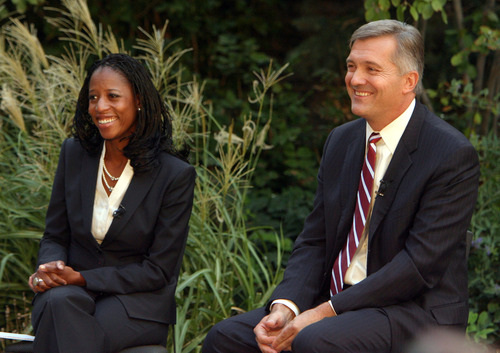This is an archived article that was published on sltrib.com in 2012, and information in the article may be outdated. It is provided only for personal research purposes and may not be reprinted.
Washington • The country is speeding toward the "fiscal cliff," but Utah's members of Congress say it makes more sense for the nation to circle around and take another run at it next year.
Essentially they want to delay action on the bevy of tax cuts and spending reductions slated to kick in Jan. 1 — despite calls from President Barack Obama and House Speaker John Boehner, R-Ohio, to strike a deal now.
"The prudent move would be to avoid the cliff by extending the status quo forward and doing it sooner than later," said Rep. Jim Matheson, D-Utah, expressing a sentiment repeated by his GOP colleagues from the state.
Sen. Mike Lee suggested a "short-term extension." Rep. Rob Bishop wants at least six months.
Sen. Orrin Hatch called for a full year.
And their view is one that is gaining traction in the Capitol, where there appears to be little optimism for a major accord before the new Congress is sworn in this January.
The deadline is an economic headache the federal government created for itself when it set the tax cuts passed under President George W. Bush to expire Jan. 1, the same day Congress must agree to cutting more than $1 trillion in federal spending or see budgets slashed indiscriminately through a process dubbed "sequestration."
There's widespread agreement among Republican and Democrats to avoid sequestration, which would indiscriminately cut $500 billion from defense spending and $500 billion from domestic programs, though little progress has been made on exactly how to do so.
The tax debate remains far more acrimonious, with Obama saying he won re-election on a promise to raise taxes on the wealthiest Americans, something Republicans and conservative Democrats such as Matheson plan to fight.
"I know the president won an election, but so did I," said Rep. Jason Chaffetz, R-Utah. "He may think he has the wind at his back, but I got elected to stand on principle, too."
And Hatch, the top Republican on the Senate Finance Committee, said of Obama: "He didn't win the House and frankly he still doesn't have enough votes in the Senate to shove us around."
Hatch said Republicans are willing to raise new government revenue through removing or capping tax exemptions and deductions, but oppose raising tax rates on anyone.
He said Obama's plan to bump tax rates on the top 2 percent of income earners would also hit 1 million small businesses.
Obama has repeatedly noted that 97 percent of small businesses would see no tax increase and in a news conference Wednesday said reducing exemptions is not enough.
"When it comes to the top 2 percent, what I'm not going to do is to extend further a tax cut for folks who don't need it, which would cost close to a trillion dollars," the president said. "And it's very difficult to see how you make up that trillion dollars — if we're serious about deficit reduction — just by closing loopholes and deductions."
With that stance, Hatch accuses Obama of being unwilling to compromise on tax reform.
"Both sides are going to have to give," Hatch said, "and I think the president is going to have to give on raising tax rates."
Bishop can't envision a scenario in which he would support a plan that would boost taxes or cut military spending, whether through sequestration or a negotiated deal between the parties.
"The military is a core responsibility. It can't sustain more cuts," said Bishop, who represents Utah's Hill Air Force Base. Congress has already reduced military spending by $487 billion over the next decade and Bishop says that's enough. Any future cuts would likely mean a loss of technology or military personnel at Hill, something he considers "impossible."
Chaffetz isn't putting his foot down on military spending, saying he's open to more targeted cuts.
He says the most important thing is that a deal, whether it comes in the next few weeks or sometime in 2013, must include immediate reductions in actual spending, not just promises of future reductions.
"If it doesn't include real cuts now," he said.
"I'm going to have a near impossible time voting for it."
Utah's federal lawmakers largely have the same goals. They want spending to decrease, the debt to fall and taxes to be made simpler. They also are unsure of how to get such a deal through a cantankerous Congress.
Asked how Congress will avoid the fiscal cliff, Bishop said: "I don't have a clue."
Twitter: @mattcanham



